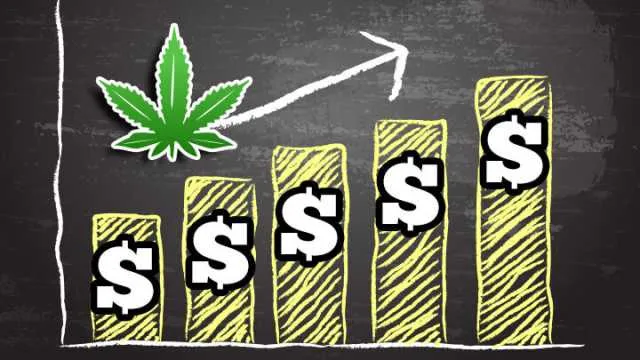
- Share on Facebook80
- Share on Pinterest
- Share on Twitter
There’s a buzz in the investment community about marijuana-based stock funds. Just a few years ago, the idea that you could buy and sell a portfolio of cannabis-related financial instruments on Wall Street would have people asking “what are you smoking?” Nowadays, however, the emerging cannabis industry is hotter than a hit of Purple Haze. As a result, many people are wondering how they can invest (and profit) from a budding industry reflects their values.
Marijuana sales in the country are really taking off. Thanks to legalization, decriminalization and medical marijuana initiatives, which have passed in more than half the states, cannabis is becoming an engine of economic growth in many parts of the United States.
The budding cannabis economy
For instance, weed sales were up 30 percent in 2016 and they are expected to triple in just the next four years alone. In fact, the cannabis industry is becoming a huge driver of economic activity. As a result, many governors and state legislatures are seeking ways to emulate the success of Colorado, where legal Marijuana-related commerce exceeded $1.3 billion dollars last year, generating more than $200 million in tax revenue.
There are a number of factors driving the truly remarkable growth of the marijuana industry. To begin with, there’s been a seismic shift in the number of citizens that support legalization. Indeed, 60 percent of Americans now support making weed commercially available.
Today, 21 percent of Americans now live in states where recreational use is permitted. In addition, 89 percent of the country approves of medical marijuana. Trends in public opinion are unmistakable and almost certainly irreversible. Consequently, pressure on lawmakers to reform the nation’s failed drug policies will only mount.
Further, America’s northern neighbor, Canada, is moving to legalize cannabis, perhaps as early as 2017. As Arcview editor Tom Adams notes, “No estimation of the size of the legal cannabis industry is complete without recognizing the new massive role Canada’s market will play as it moves toward legalizing adult use.”
The prospects for the marijuana industry are promising

Numerous analysts are forecasting the same explosive compound annual growth that cable experienced in the 1990s and broadband had in 2000s.
In 2016, marijuana-related revenue amounted to $6.7 billion. Experts are predicting a 25 percent annual growth rate. This would mean the marijuana industry could hit $20.2 billion in the next four years. Some financial analysts are even more sanguine — they anticipate pot-related sales eclipsing $50 billion dollars per annum within a decade.
Washington and Colorado, two of the first states to legalize recreational use, have raked in more than $456 million in tax revenue. California is projected to bring in about $1 billion in tax dollars. This is the kind of money that can shrink budget gaps and dramatically improve a state’s fiscal position. As a result, legislators throughout the country are jumping on the pot bandwagon. For example, lawmakers in 17 states are busy crafting measures that would tax the proceeds from retail pot sales.
Capitalizing on the marijuana industry
Long-term, analysts are very bullish on the marijuana industry. Chris Walsh of the Marijuana Business Daily insists “Our [optimistic] projections reflect marijuana’s march towards the mainstream as it emerges from the shadows to become a respectable, above-board industry that is giving birth to scores of jobs, fostering new business opportunities and creating a broad ripple effect across the country.”
Despite enormous upside potential, many marijuana-related companies trading in the market are difficult to value. To begin with, many cannabis-related businesses (and funds) are not well-established. Compounding matters, so long marijuana remains illegal under federal these companies will face formidable challenges accessing capital from banks. In addition, there’s always the possibility that a zealous justice department, led by the notoriously anti-marijuana Jeff Sessions, could seize assets or even jail budding cannabis entrepreneurs. Investors need to be mindful of the risks of investing in this sector.
To protect investors, some funds are limiting their exposure by avoiding companies that are involved in recreational marijuana. For example, a yet-to-be-launched Exchange Traded Fund, tentatively named Emerging Agrosphere, will only invest in hemp-based cannabis companies focused on medicinal products or businesses that are in the medical-hemp supply chain. In their public filing the fund’s managers declare that “The fund will not invest in any companies that are focused on serving the non-medical marijuana market in the United States, Canada or any other country unless and until such time as the production and sale of non-medical marijuana becomes legal in the United States, Canada or such other country, respectively.”
Why Trump is unlikely to crackdown on cannabis

Increasingly, many observers believe that the Trump administration is unlikely to deviate substantially from the Obama’s administration’s hands-off approach to the legalization happening on the state level. After all, support for both medical marijuana and recreational use is popular in both red and blue states.
Furthermore, political and economic analysts contend that President Trump — who rarely talks (and never tweets) about marijuana — is averse to alienating libertarians, state’s rights conservatives and displaced rural workers in toss-up states like Colorado where the marijuana industry has become an employment engine. For example, in the last year alone, the marijuana industry helped the Centennial State add 18,000 new jobs. It also generated $2.4 billion dollars in economic activity.
Yes, President Trump could make life miserable for cannabis-related companies. But given where public opinion is on this issue, there’s very little political advantage for him to buck the status quo. In the past, politicians have used marijuana as a convenient bogeyman to channel voter frustration and anger. However, the all-natural herb is now too popular to fulfill the function of being a scapegoat. Therefore, most experts do not expect federal authorities to substantially interfere with state marijuana markets.
Factors working in favor of cannabis companies
In sum, the prospects look bright for the marijuana industry as a whole. Investing gurus often look for “self-reinforcing or virtuous cycles,” which refer to trends and market conditions that reinforce one another. Presently, there are a lot of factors working in favor of cannabis-based companies:
- Mainstream public approval of medical marijuana.
- Lawmakers eager to reap tax revenue from commercial and retail cannabis activity. Politicians will eventually “follow the money.” According to Harvard economist, Jeffrey Miron, at least $45 billion in potential tax revenue is now slipping through the government’s hands.
- Marijuana has become an economic multiplier. Every dollar spent in the industry generates $2.40 in financial activity.
- Spillover and supply chain effects attending legalization represent a huge opportunity for packaging, processing and transportation players.
- Going after marijuana has become political suicide.
- The legal cannabis industry is expected to generate 300,000 jobs by 2020.
A cannabis-fueled economic revolution?

Marijuana, like any commodity, is subject to the laws of supply and demand. As restrictions are eased, the price of pot in the retail market will likely drop. However, higher consumption and the imagination of entrepreneurs will likely more than offset lower cannabis prices.
Budtenders, tourism, bakeries (making edibles) and delivery services are just a few of the industries that stand to benefit from a cannabis-fueled economic revolution.
Indeed, there’s even a wellness company offering brain imaging technology to help patients pick out strains of medical cannabis right for their medical conditions. Personalized medicine and pot. It’s just one of the amazing opportunities in a cannabis industry that’s just taking off and likely to offer heady opportunities for savvy investors.
— Scott O’Reilly
- Share on Facebook80
- Share on Pinterest
- Share on Twitter

